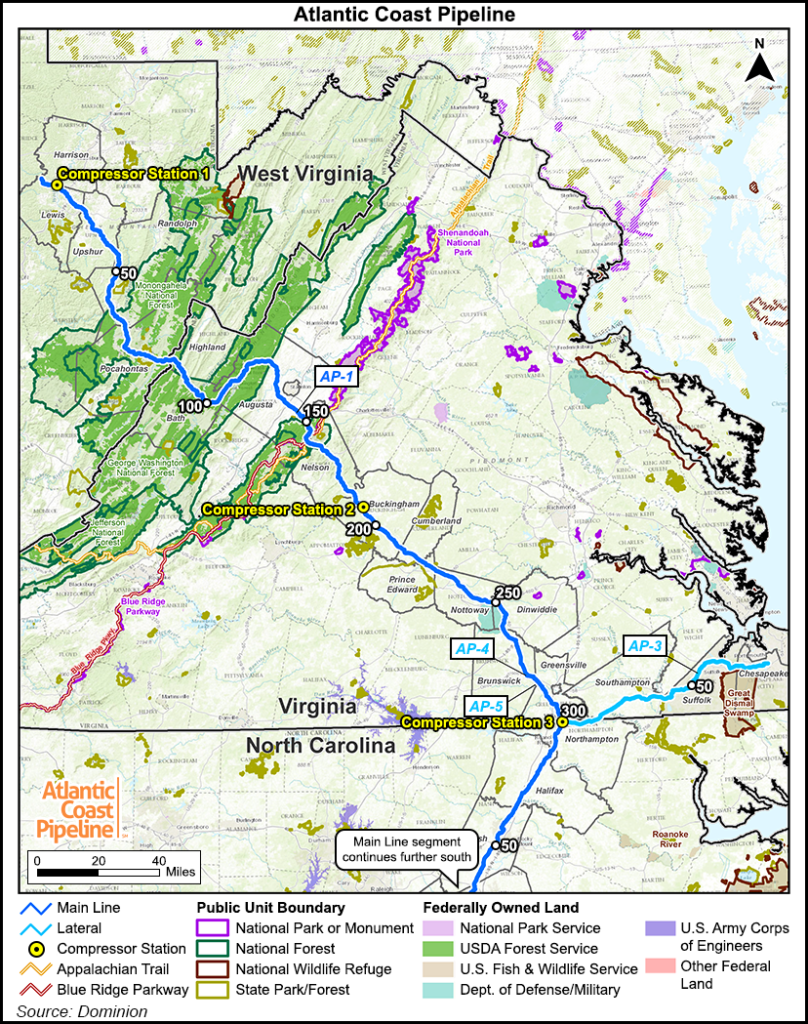Infrastructure | E&P | NGI All News Access
ACP Again Threatened as Fourth Circuit Intervenes Once More
The U.S. Court of Appeals for the Fourth Circuit on Friday tossed another critical federal approval for the Atlantic Coast Pipeline (ACP), threatening further construction delays and adding to a record of decisions against the project.

In the order, the Fourth Circuit vacated and remanded the Biological Opinion (BO) and Incidental Take Statement (ITS) reissued to ACP last year by the U.S. Fish and Wildlife Service (FWS). The FWS had reissued the approvals following a successful court challenge by environmental groups opposing ACP, which saw the court toss the initial BO and ITS issued to the project in 2017.
The court concluded that the FWS failed to fulfill its requirements under the Endangered Species Act (ESA) and that its actions were “arbitrary and capricious.” Specifically, the judges ruled that the agency failed to adequately establish safeguards to protect the rusty patched bumble bee, the clubshell, the Indiana bat and the Madison Cave isopod from the potential impacts of pipeline construction.
The Fourth Circuit took a dim view of the amount of time the FWS took to reissue the BO and ITS.
“We cannot ignore that it took FWS a mere 19 days to issue the 2018 BO and ITS” after FERC resumed formal consultation with the agency following our first decision in this matter,” the court wrote. “In fast-tracking its decisions, the agency appears to have lost sight of its mandate under the ESA…We hope that, upon remand, FWS will consider any further action it takes with this mandate in mind.”
The ruling raises new questions for a project already mired in legal and regulatory uncertainty. ACP, proposing a 600-mile greenfield path from West Virginia into Virginia and North Carolina, has found itself in the crosshairs of environmental and opposition groups for years. Faced with relentless opposition, federal agencies have had a difficult time defending their approvals of the project before the Fourth Circuit.
In fact, ACP has turned to the U.S. Supreme Court to try to overturn an unfavorable Fourth Circuit decision that puts the pipeline’s plans to cross the Appalachian National Scenic Trail in jeopardy. The Fourth Circuit late last year also ruled that the U.S. Forest Service “abdicated its responsibility to preserve national forest resources” in approving ACP’s proposed crossing of the George Washington and Monongahela national forests.
In light of the latest ruling to go against ACP, the possibility that the project will have to develop an alternative route remains on the table, according to analysts at Washington, DC-based ClearView Energy Partners LLC.
“Maintaining the current route may prove to be a tall order,” ClearView said. “We would not rule out the possibility that a reroute/certificate amendment may yet lie ahead. If resolution requires a certificate amendment, such processes can require a year or more” to complete the process at the Federal Energy Regulatory Commission. “Based on current information, we cannot say that a reroute would result in a larger delay” versus the FWS revising the BO and ITS for a third time.
Reissuing the authorizations for the current route would allow ACP to resume construction, “as it did back in September 2018,” the analysts noted. “Project opponents could again turn to the Fourth Circuit to seek a stay of such reissued permits. At that point, the Fourth Circuit would evaluate anew whether any alleged errors justify a new stay on reissued permits pending review of new appeals.”
ACP is a joint venture of Dominion Energy Transmission Inc., Duke Energy Corp., Piedmont Natural Gas and Southern Company Gas.
Prior to Friday’s ruling, the developers had been targeting partial in-service for ACP by late 2020, with full in-service by 2021. ACP spokesman Aaron Ruby on Friday reiterated the late 2021 in-service target.
“Based on the clear direction provided by the court” in the new opinion, “we expect FERC and the Fish and Wildlife Service will be able to immediately begin working to correct the errors identified by the court,” Ruby said. “Once the new Biological Opinion and Incidental Take Statement are issued, we will seek the necessary approval” from FERC to resume construction. “We’re confident we remain on track to complete the project by late 2021.”
Dominion is scheduled to hold a conference call Wednesday (July 31) to discuss 2Q2019 financial results.
Environmental groups on Friday celebrated the Fourth Circuit’s latest ruling.
“The polluting corporations behind this dirty, dangerous project rushed their application process because they wanted to make a quick buck, and the government agencies tasked with protecting our water, wildlife and health were all too happy to fast-track the reviews for them, but now their chickens are coming home to roost,” Sierra Club attorney Nathan Matthews said. “We have said all along that many of the ACP’s permits were issued in flawed, rushed processes, and time after time, the courts have agreed.”
© 2024 Natural Gas Intelligence. All rights reserved.
ISSN © 2577-9877 | ISSN © 2158-8023 |
